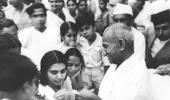The op-ed ends with a call to the world to work shoulder to shoulder to end hate, violence and suffering.

Observing that Mahatma Gandhi envisioned Indian nationalism as one that was never narrow or exclusive, Prime Minister Narendra Modi on Wednesday proposed what he called the 'Einstein Challenge' to ensure Gandhi's ideals are remembered by future generations.
Modi said this in an op-ed in The New York Times as he paid glowing tributes to Mahatma Gandhi on his 150th birth anniversary, describing him as the "best teacher" and "the guiding light" who continues to give courage to millions globally and uniting those who believe in humanity.
"As a tribute to Gandhi, I propose what I call the Einstein Challenge. We know Albert Einstein's famous words on Gandhi: 'Generations to come will scarce believe that such a one as this ever in flesh and blood walked upon this earth'," Modi wrote in the op-ed titled 'Why India and the World Need Gandhi'.
"How do we ensure the ideals of Gandhi are remembered by future generations? I invite thinkers, entrepreneurs and tech leaders to be at the forefront of spreading Gandhi's ideas through innovation."
The op-ed ends with a call to the world to work shoulder to shoulder to end hate, violence and suffering.
"That is when we will fulfil Mahatma Gandhi's dream, summed up in his favourite hymn, 'Vaishnava Jana To', which says that a true human is one who feels the pain of others, removes misery and is never arrogant. The world bows to you, beloved Bapu!" Modi wrote.
The prime minister said that for Gandhi, independence was not absence of external rule, but a deep link between political independence and personal empowerment.
"He envisioned a world where every citizen has dignity and prosperity...Gandhi gave us the doctrine of trusteeship, which emphasised the socio-economic welfare of the poor. Inspired by that, we should think about a spirit of ownership. We, as inheritors of the earth, are responsible for its well-being, including that of the flora and fauna with whom we share our planet," Modi said.
"In Gandhi, we have the best teacher to guide us. From uniting those who believe in humanity to furthering sustainable development and ensuring economic self-reliance, Gandhi offers solutions to every problem," he wrote.
The prime minister also talked about the ideals epitomised by the apostle of peace who inspired such iconic leaders as Martin Luther King Jr and Nelson Mandela.
"The guiding light whose inspiration got Dr King to India was Mohandas Karamchand Gandhi, the Mahatma, the Great Soul. On Wednesday, we observe his 150th birth anniversary. Gandhi Ji, or Bapu, continues to give courage to millions globally."
Elaborating on Gandhi's vision on nationalism, the prime minister noted that Gandhi "envisioned Indian nationalism as one that was never narrow or exclusive but one that worked for the service of humanity."
Modi stated that Gandhi possessed a "unique ability" to become a bridge between some of the greatest contradictions in human society and epitomised trust among all sections of society.
The prime minister also lauded Gandhi for combining ordinary objects like charkha, spinning wheel, and khadi with "mass politics" and asserts that he was never tempted by power.
"Who else could have used a charkha, a spinning wheel, and khadi, Indian homespun cloth, as symbols of economic self-reliance and empowerment for a nation?" he asked.
"Who else could have created a mass agitation through a pinch of salt!... Through the Dandi March in 1930, Gandhi challenged the Salt Laws. His picking up a small lump of natural salt from the Arabian Sea shore led to the historic civil disobedience movement," he wrote.
There have been many mass movements in the world, many strands of the freedom struggle even in India, but what sets apart the Gandhian struggle and those inspired by him is the wide-scale public participation. He never held administrative or elected office. He was never tempted by power, Modi noted.
Modi also explained how his government was trying to fulfil Gandhi's dreams and is committed to do even more with the world and for the world.
"We in India are doing our bit. India is among the fastest when it comes to eliminating poverty. Our sanitation efforts have drawn global attention. India is also taking the lead in harnessing renewable resources through efforts like the International Solar Alliance, which has brought together several nations to leverage solar energy for a sustainable future."









